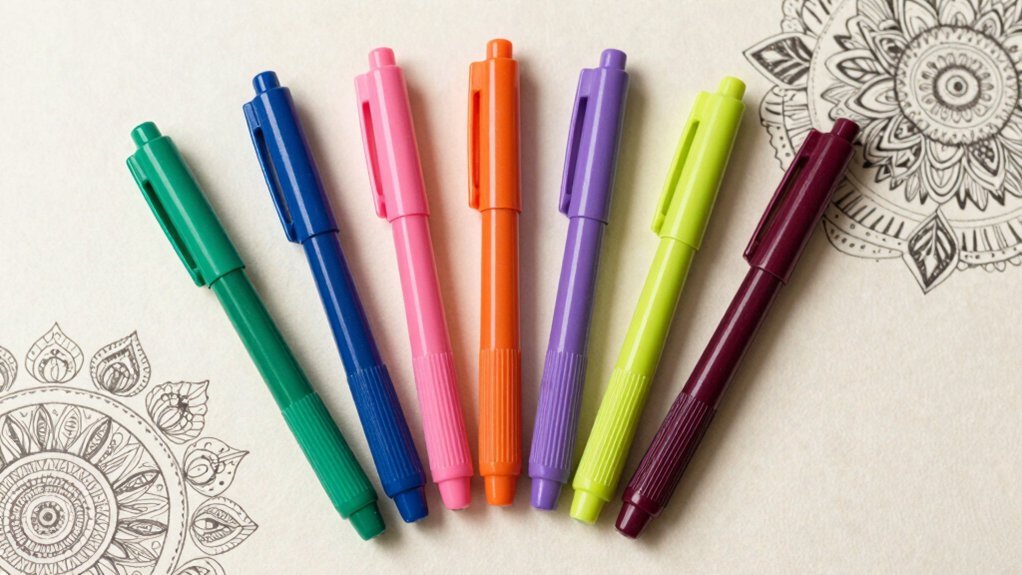Journaling daily can truly ease your anxiety in three key ways. First, it enhances self-reflection by giving you a safe space to explore your thoughts and feelings, helping you spot triggers and patterns. Second, it reduces stress levels by allowing you to articulate your stressors, shifting your focus to the present moment, and fostering mindfulness. Finally, it promotes emotional clarity by letting you untangle complex emotions without judgment, tracking your emotional progress along the way. By making journaling a part of your routine, you'll reveal even more benefits that can support your mental well-being.
Enhances Self-Reflection

Journaling enhances self-reflection by providing you with a dedicated space to explore your thoughts and feelings. When you put pen to paper, you engage in a dialogue with yourself that can lead to deeper understanding. You might find that ideas you thought were clear become more nuanced as you write them down.
As you reflect on your day or specific events, you can identify patterns in your thoughts and behaviors. This awareness can help you recognize triggers for your anxiety and understand how certain situations affect your mental state. By documenting your emotions, you get to see your feelings from a distance, which allows you to respond to them more thoughtfully rather than react impulsively.
Moreover, journaling encourages you to set goals and track your progress. When you regularly assess your thoughts and feelings, you can pinpoint areas where you want to grow. This proactive approach not only fosters self-discovery but also empowers you to make intentional changes in your life.
Reduces Stress Levels
One powerful way to reduce stress levels is through the act of journaling. When you take time to write down your thoughts and feelings, you create a safe space for self-expression. This process allows you to unload the mental burdens you carry, helping to clear your mind. By articulating what's bothering you, you can gain perspective on the sources of your stress.
You might find that writing your worries down can help you identify patterns or triggers. Once you recognize these stressors, you can develop strategies to address them. Journaling also encourages mindfulness, as it forces you to slow down and focus on the present moment, which can be incredibly grounding.
Additionally, reflecting on positive experiences or things you're grateful for can shift your mindset. This shift can reduce feelings of anxiety, making it easier to cope with everyday challenges.
Promotes Emotional Clarity

Writing regularly can greatly promote emotional clarity. When you put pen to paper, you create a space to explore your thoughts and feelings without judgment. This practice helps you identify complex emotions that might otherwise remain tangled and confusing. By expressing your feelings in writing, you gain insight into what's really bothering you, allowing you to address issues head-on.
As you articulate your thoughts, patterns and recurring themes often emerge. You might realize that certain situations trigger anxiety or that specific relationships weigh heavily on your mind. This awareness is the first step toward understanding and managing your emotions effectively.
Moreover, journaling allows you to track your emotional progress over time. You can look back at past entries and see how your feelings have evolved. This reflection can be incredibly empowering, reminding you of your capacity for growth and change.
Ultimately, when you make journaling a habit, you equip yourself with a valuable tool for emotional clarity. You learn to navigate your feelings more effectively, reducing anxiety and fostering a greater sense of peace in your daily life.
Frequently Asked Questions
How Often Should I Journal to See Results?
You should aim to journal daily for at least a few minutes. This consistency helps you observe patterns, process emotions, and ultimately see significant results in your mindset and overall well-being over time.
What Types of Journaling Are Most Effective for Anxiety?
To tackle anxiety, try expressive writing, gratitude journaling, or bullet journaling. Each method allows you to process emotions, recognize positivity, and stay organized, helping you manage your thoughts and feelings more effectively.
Can Digital Journaling Be as Beneficial as Handwritten Journaling?
Digital journaling can be just as beneficial as handwritten journaling. It offers convenience and flexibility, allowing you to express thoughts and feelings anytime. Find what works best for you; both methods can support emotional well-being.
Should I Date My Journal Entries?
You should definitely date your journal entries. It helps you track your thoughts and emotions over time, giving you insight into patterns and growth. Plus, it adds context, making your reflections more meaningful and memorable.
Is There a Specific Time of Day to Journal for Anxiety Relief?
There isn't a specific time that works for everyone. Experiment with morning or evening journaling to see when you feel most relaxed. Consistency helps, so choose a time that fits your schedule best.
In Summary
Incorporating journaling into your daily routine can transform the way you handle anxiety. By enhancing self-reflection, reducing stress levels, and promoting emotional clarity, you equip yourself with powerful tools to navigate life's challenges. So grab a notebook and start writing—your thoughts and feelings deserve to be heard. As you make journaling a habit, you'll likely find a greater sense of peace and understanding within yourself, making each day a little easier to face.





Leave a Reply